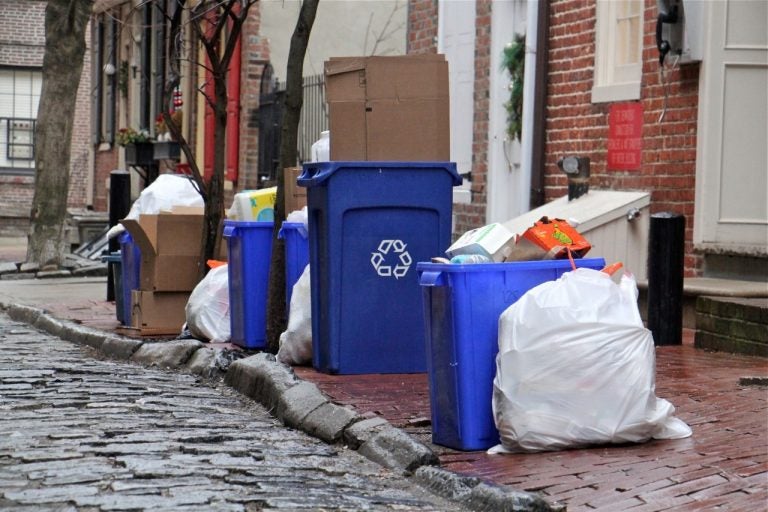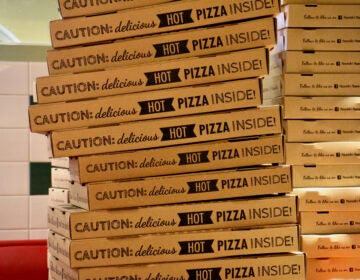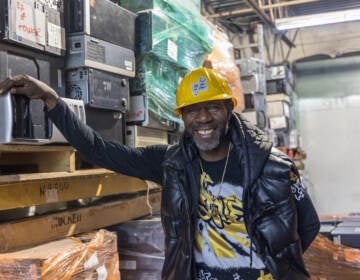Streets Department: Philly to stop burning recyclables
At a budget meeting Wednesday, the Philadelphia Streets Department chief told City Council that all the recycling material the city collects will soo be recycled again.

Recycling bins on Cuthbert Street in Philadelphia. (Emma Lee/WHYY)
This article originally appeared on PlanPhilly.
—
The Philadelphia Streets Department is responsible for a host of important functions including trash pickup, road safety infrastructure, and street sweeping (or not).
But few of these policy areas were given sustained attention at the department’s sparsely populated annual budget hearing Wednesday. Just four Council members attended.
Eight minutes of the hearing — which lasted less than an hour — were devoted to the dumpsters around McGillin’s Olde Ale House. Another six minutes went to a discussion of years-old technology on SEPTA buses allowing the vehicles to extend a green light by 10 seconds
Streets Department Commissioner Carlton Williams did reveal that, by the end of this month, all of the city’s recycling material will actually be recycled again. In the wake of policy changes in China, which has long processed much of America’s recycling, half of Philadelphia’s recycling has been going to an incinerator in Chester, Pennsylvania. That option was seen as a stop-gap measure.
“The interim agreement in which we were forced into taking half our material to a waste energy facility will end by the end of this month,” said Williams. “We will be returning 100 percent of our material back to reprocessing at a material recovery facility.”
Councilman Allan Domb expressed concerns about the environmental effects of a street sweeping pilot, which requires teams of seven workers to drive trash into the street with gas-powered leaf blowers.
Critics of the method have said the technique spews carbon emissions into the air and creates noise pollution. (The technology is actually banned in Washington, D.C.) Domb said he had read that running a gas-powered leaf blower for 30 minutes generates the same amount of carbon emissions as driving a three-ton pickup truck from Philadelphia to Costa Rica.
“We are being very sensitive to the environmental concerns posed by the groups opposed to us using this method,” said Williams.
Williams said the Streets Department uses the blowers because, otherwise, it would be impossible for sweepers to reach the litter on sidewalks. He said that other options had been tested, including using a power-washing system connected to a mechanical street sweeper, which would flood trash onto the street. That took far too long, Williams said.
But he emphasized that this is just a pilot, and that the Streets Department is studying the well-documented environmental concerns caused by leaf blowers.
“The last thing we want to do is create health hazards for any individuals,” said Williams. “We are going to continue to try this pilot, and, if it does have health effects, then we’ll have to circle the wagon and consider another option. But right now, we think this is the most effective method.”
Asked after the hearing if the labor intensive system could extend to the entire city, Williams agreed that it would prove a challenge. He also acknowledged he knows of no other city using the method to clean streets.
“Where we got it from is when we clean up after events like the Eagles parade,” said Williams. “The reason we get the city back to business so quickly is we have manpower blowing those things back to the streets.”
City Council President Darrell Clarke said that city residents are responsible for the condition of the streets as well.
“You talked about this issue of environmentally sound ways of moving trash off the street,” said Clarke. “I think the most environmentally sound way of doing that is for people to stop throwing trash on the street. At the end of the day, people in this city need to stop being pigs.”
WHYY is your source for fact-based, in-depth journalism and information. As a nonprofit organization, we rely on financial support from readers like you. Please give today.







